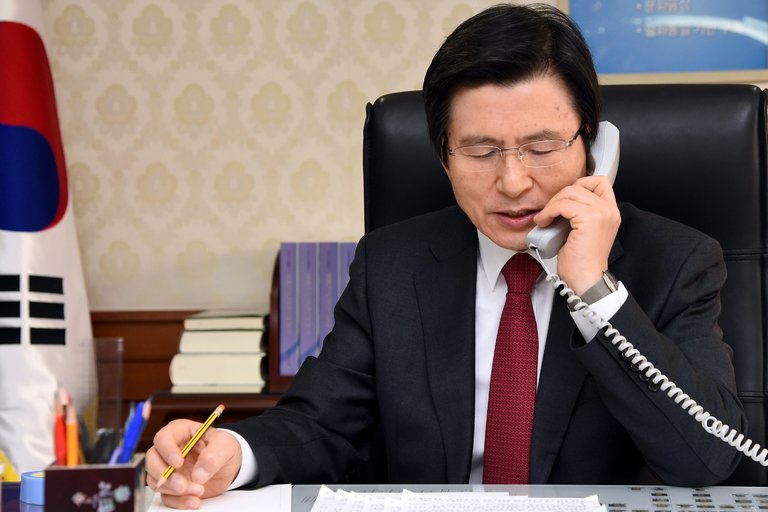President Trump reaffirmed the U.S. commitment to its alliance with South Korea via a phone call with acting South Korean President, Hwang Kyo-ahn, over the weekend.
Tensions in the region are high as a result of continued Chinese military expansion in the South China Sea, and in what amounts to a more direct threat to South Korea, Kim Jong Un’s persistent efforts to develop nuclear weapons in their neighbor to the north.
The South Korean government quoted President Trump in a statement saying he assured the South Korean people who America would support the allied nation “100%.” Along the campaign trail, Trump left many questioning whether or not South Korea could rely on American support, when he suggested that the Asian nation was not paying enough to make keeping the near 30,000 American troops stationed there logical.
“President Trump reiterated our ironclad commitment to defend the R.O.K., including through the provision of extended deterrence, using the full range of military capabilities,” an official statement from the White House said of their telephone conversation.
“The two leaders agreed to take steps to strengthen joint defense capabilities to defend against the North Korean threat.”
New Secretary of Defense, James Mattis, is slated to make his first trip to the region later this week, a move the new president says indicates America’s strong commitment to the defense of our allies in that portion of the globe.
In what is perhaps not coincidental timing, satellite imaging suggests that the North Korean government has restarted operations in their nuclear facilities. Kim Jong Un has stated that his nation is on the verge of testing their first intercontinental ballistic missile. Though little is known for certain about the platform (to include whether or not it will work) it seems unlikely that their newest payload delivery system would be capable of reaching US shores, and if it could it would almost certainly lack the technological capability to breach America’s missile defense network, but such long-range capabilities could spell trouble for American allies throughout that portion of the world.
North Korea’s tenuous political ties to China could likely grow stronger in the face of Donald Trump’s aggressive stance regarding Chinese trade – which has already led some Chinese officials to indicate that China is preparing for the possibility of armed conflict between the two countries. With the ongoing presence of the US Navy in Asia’s international waterways, these tensions likely won’t boil over into a real fight for some time (if ever) but that natural timeline of mounting tension could provide ample opportunity for China and North Korea, as well as other ne’er-do-well nations, to form stronger ties in the face what promises to be a buildup of America’s military might under President Trump.
A state-owned, Chinese military website recently ran a commentary piece about tensions between China and the US, in which Liu Guoshun, a member of the national defense mobilization unit of China’s Central Military Commission, wrote “The possibility of war increases. ‘A war within the president’s term,’ ‘war breaking out tonight’ are not just slogans, but the reality.”
“The Chinese government is quite concerned about the potential for direct confrontation with the Trump administration,” Ian Bremmer, president and founder of global political risk consultancy, Eurasia Group, told CNBC.
“China doesn’t want trouble with the US, especially not in the run up to their own leadership transition this fall,” Bremmer continued. “But if it comes, they want President Trump to understand the consequences.”
Already have an account? Sign In
Two ways to continue to read this article.
Subscribe
$1.99
every 4 weeks
- Unlimited access to all articles
- Support independent journalism
- Ad-free reading experience
Subscribe Now
Recurring Monthly. Cancel Anytime.


COMMENTS